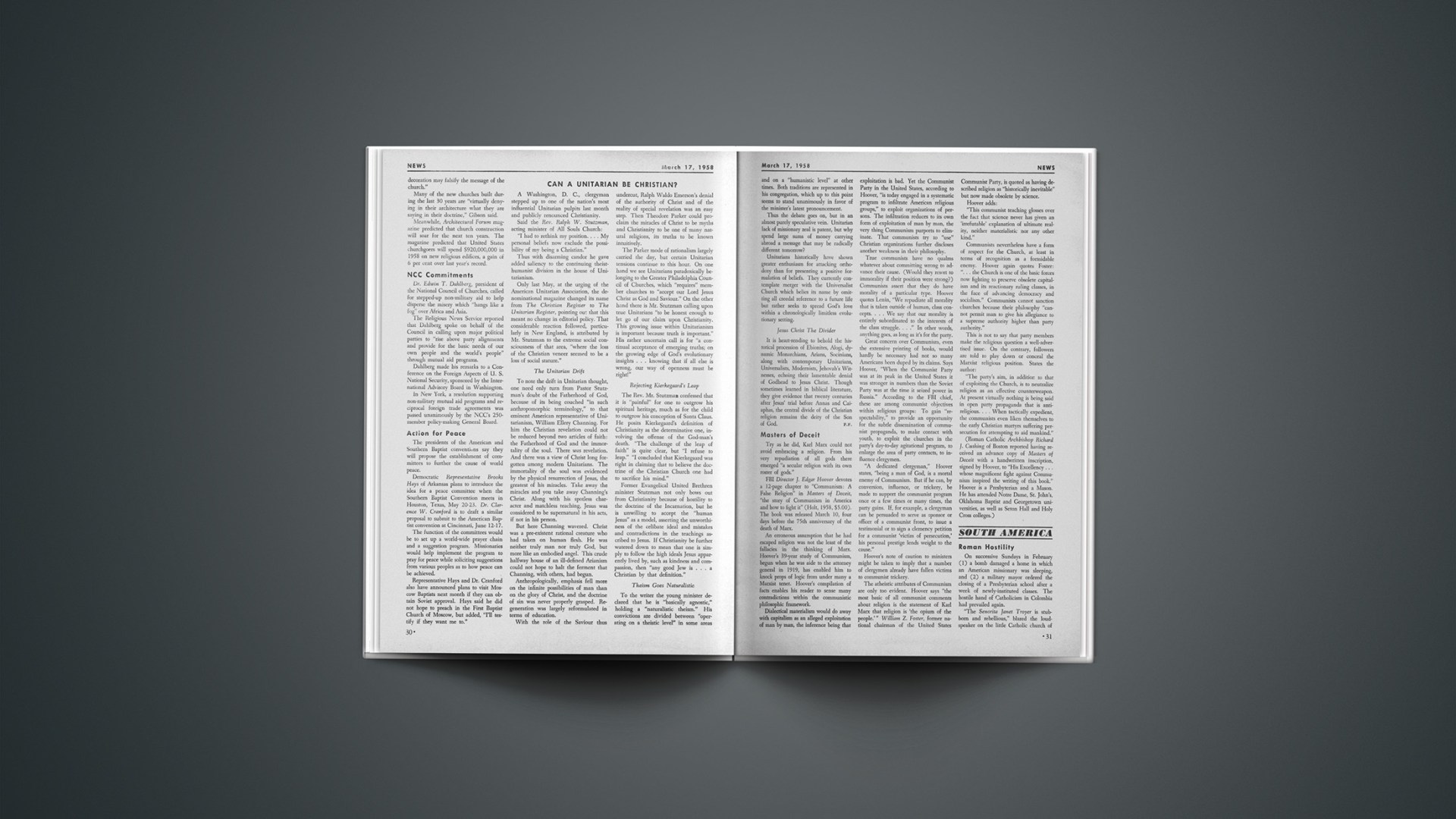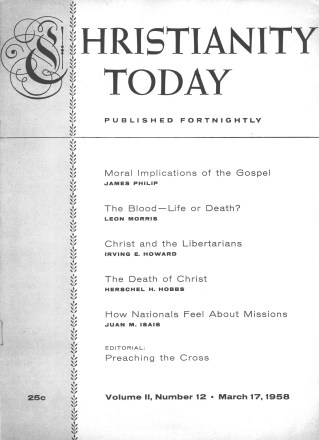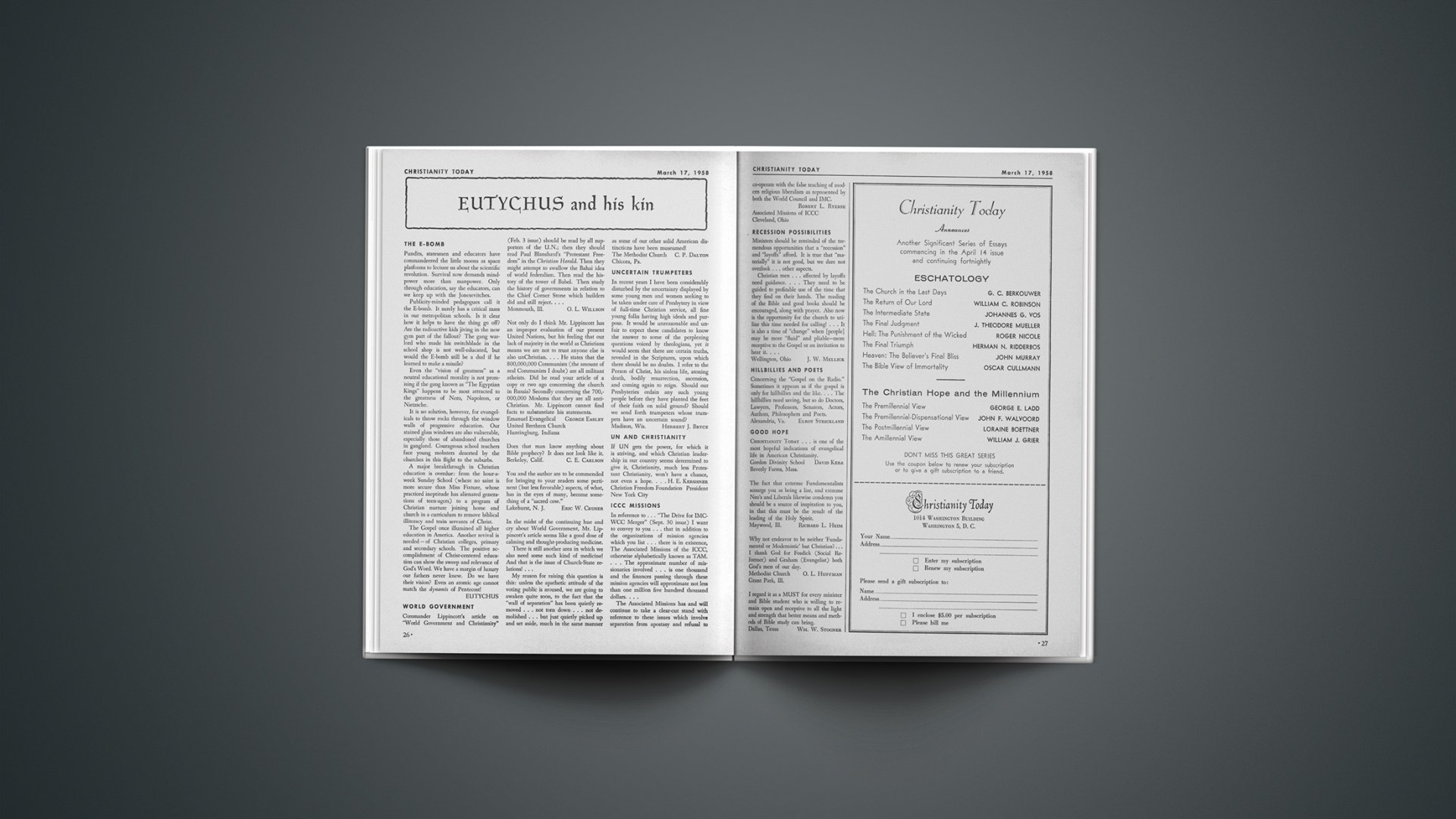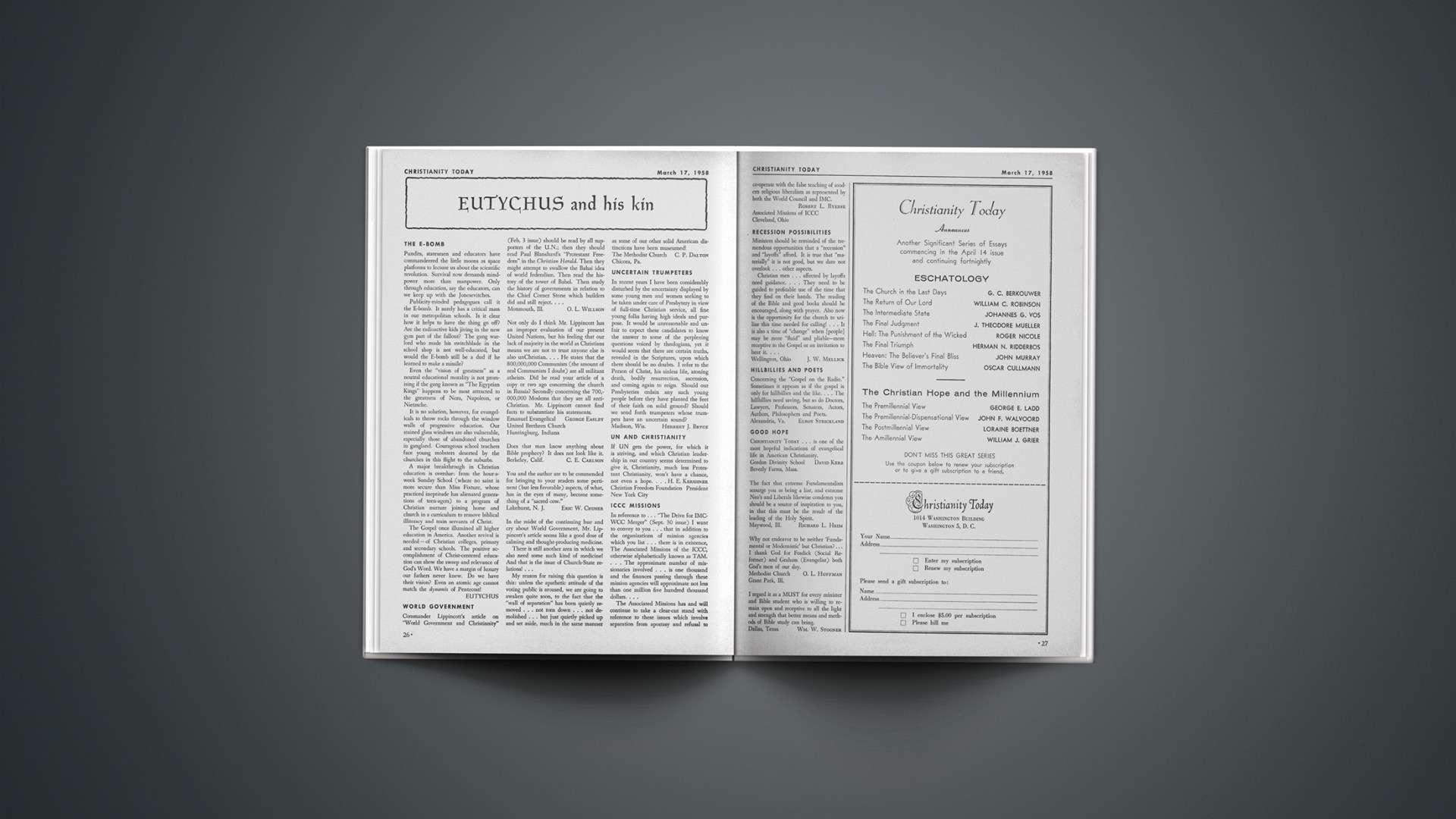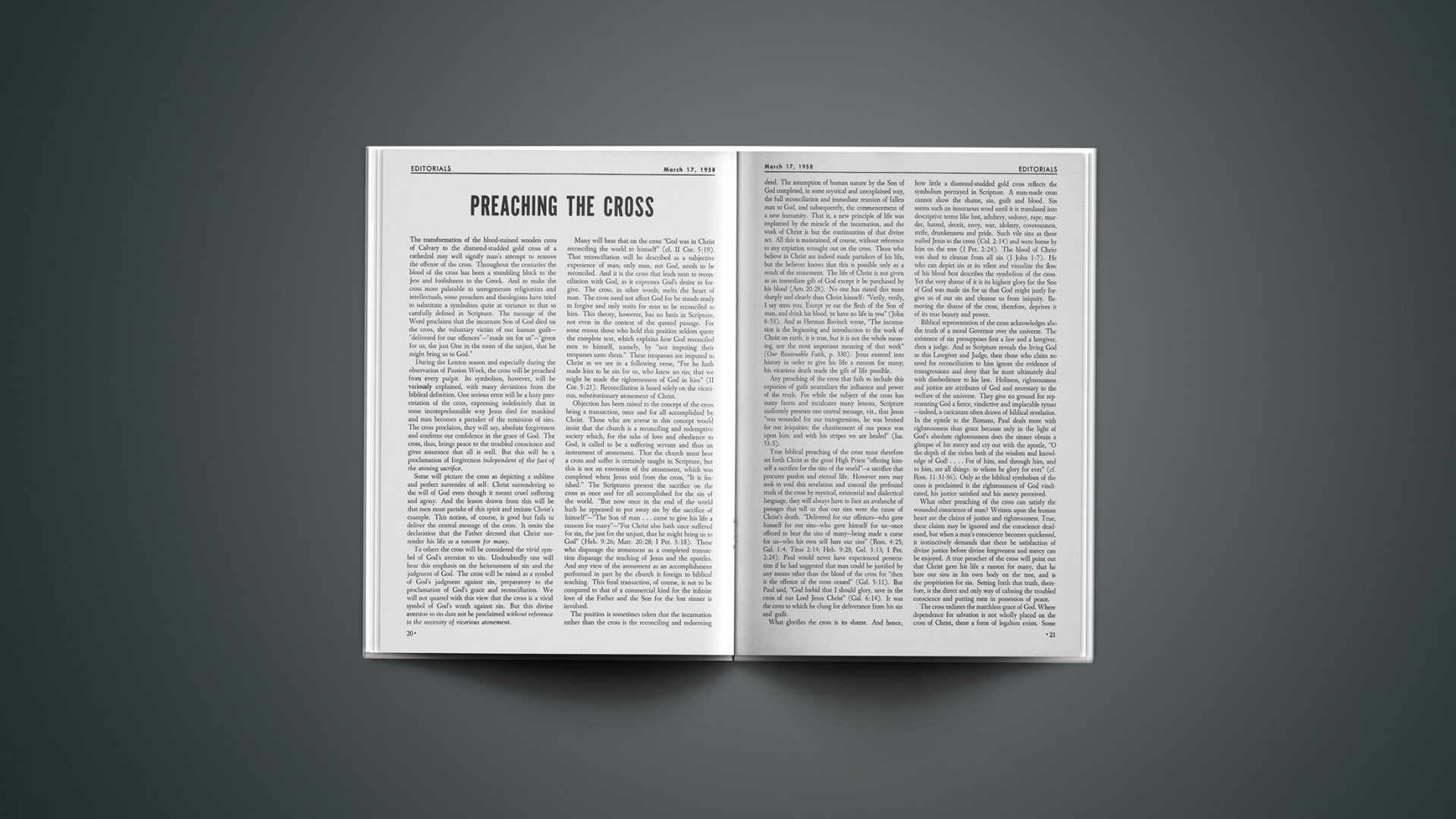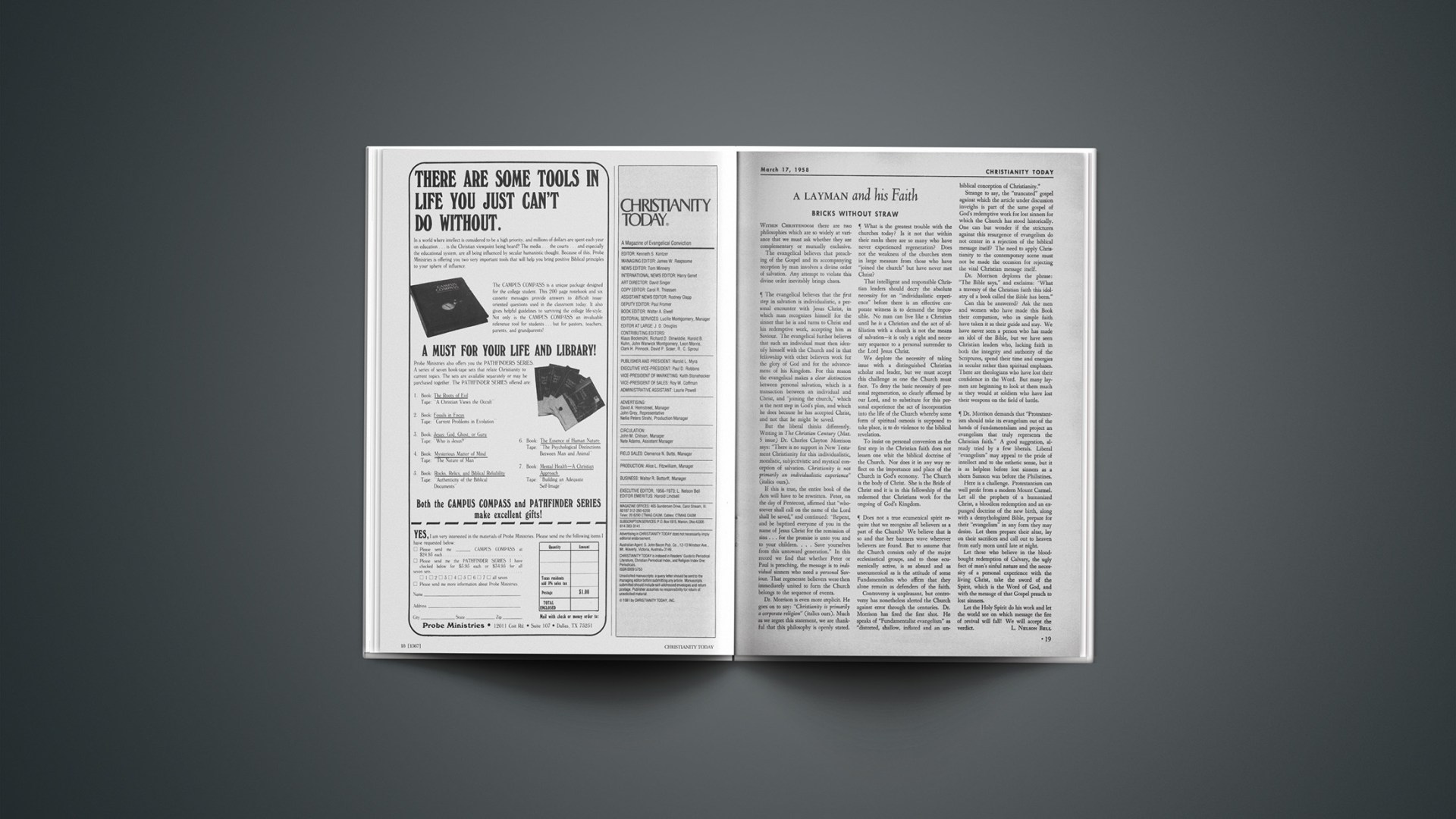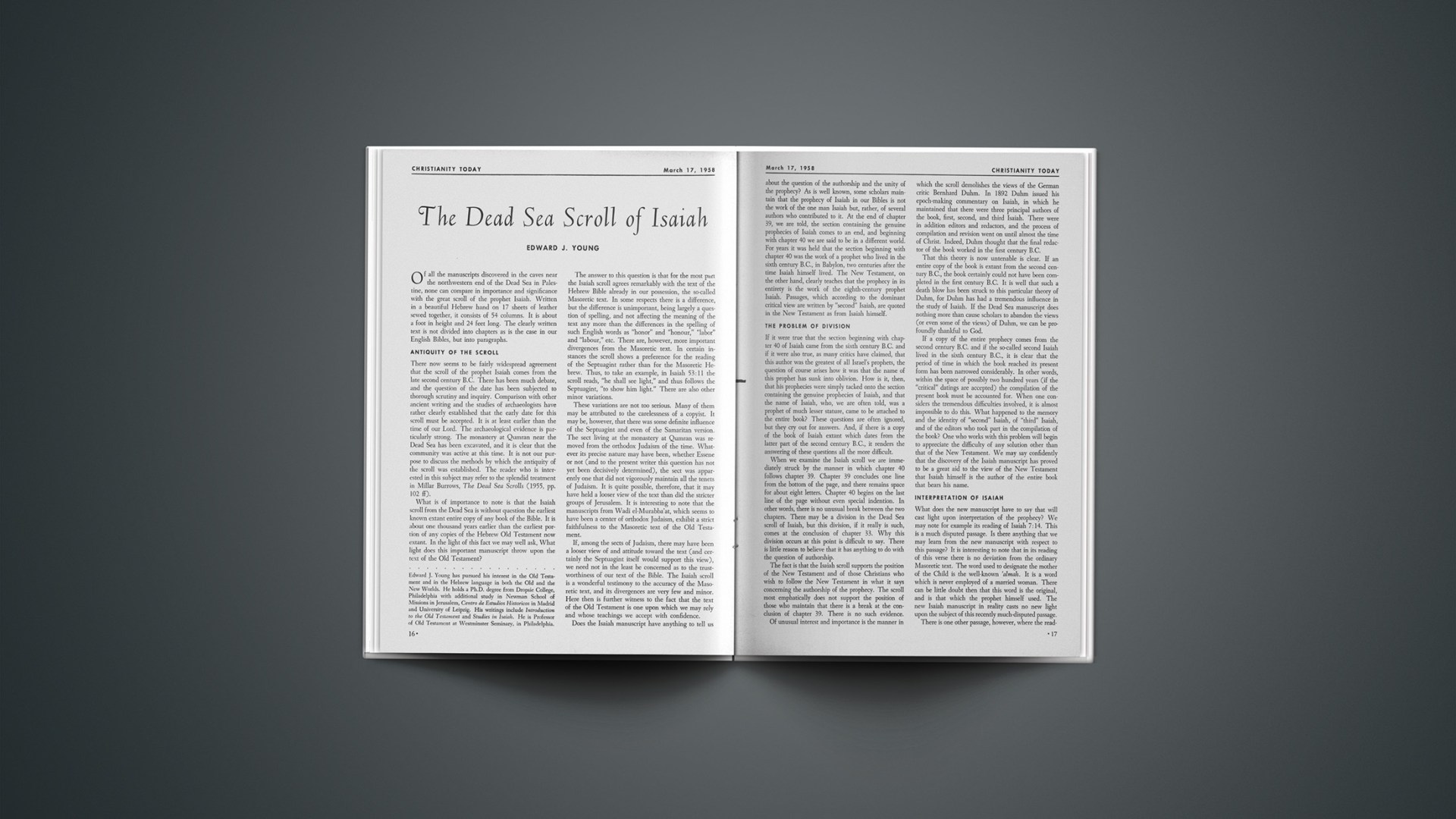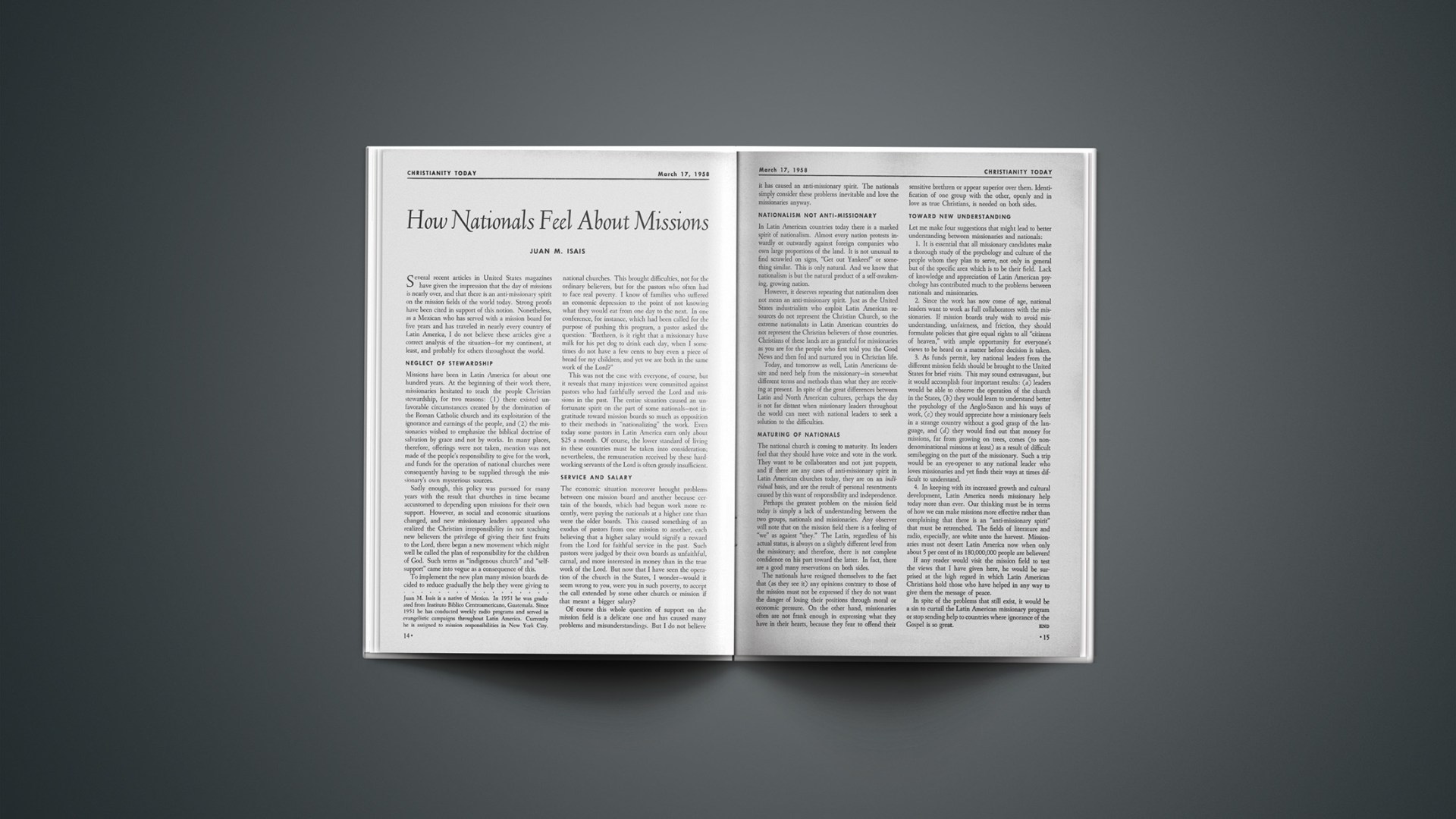A Washington, D. C., clergyman stepped up to one of the nation’s most influential Unitarian pulpits last month and publicly renounced Christianity.
Said the Rev. Ralph W. Stutzman, acting minister of All Souls Church:
“I had to rethink my position.… My personal beliefs now exclude the possibility of my being a Christian.”
Thus with disarming candor he gave added saliency to the continuing theist-humanist division in the house of Unitarianism.
Only last May, at the urging of the American Unitarian Association, the denominational magazine changed its name from The Christian Register to The Unitarian Register, pointing out that this meant no change in editorial policy. That considerable reaction followed, particularly in New England, is attributed by Mr. Stutzman to the extreme social consciousness of that area, “where the loss of the Christian veneer seemed to be a loss of social stature.”
The Unitarian Drift
To note the drift in Unitarian thought, one need only turn from Pastor Stutzman’s doubt of the Fatherhood of God, because of its being couched “in such anthropomorphic terminology,” to that eminent American representative of Unitarianism, William Ellery Channing. For him the Christian revelation could not be reduced beyond two articles of faith: the Fatherhood of God and the immortality of the soul. There was revelation. And there was a view of Christ long forgotten among modern Unitarians. The immortality of the soul was evidenced by the physical resurrection of Jesus, the greatest of his miracles. Take away the miracles and you take away Channing’s Christ. Along with his spotless character and matchless teaching, Jesus was considered to be supernatural in his acts, if not in his person.
But here Channing wavered. Christ was a pre-existent rational creature who had taken on human flesh. He was neither truly man nor truly God, but more like an embodied angel. This crude halfway house of an ill-defined Arianism could not hope to halt the ferment that Channing, with others, had begun.
Anthropologically, emphasis fell more on the infinite possibilities of man than on the glory of Christ, and the doctrine of sin was never properly grasped. Regeneration was largely reformulated in terms of education.
With the role of the Saviour thus undercut, Ralph Waldo Emerson’s denial of the authority of Christ and of the reality of special revelation was an easy step. Then Theodore Parker could proclaim the miracles of Christ to be myths and Christianity to be one of many natural religions, its truths to be known intuitively.
The Parker mode of rationalism largely carried the day, but certain Unitarian tensions continue to this hour. On one hand we see Unitarians paradoxically belonging to the Greater Philadelphia Council of Churches, which “requires” member churches to “accept our Lord Jesus Christ as God and Saviour.” On the other hand there is Mr. Stutzman calling upon true Unitarians “to be honest enough to let go of our claim upon Christianity. This growing issue within Unitarianism is important because truth is important.” His rather uncertain call is for “a continual acceptance of emerging truths; on the growing edge of God’s evolutionary insights … knowing that if all else is wrong, our way of openness must be right!”
Rejecting Kierkegaard’s Leap
The Rev. Mr. Stutzman confessed that it is “painful” for one to outgrow his spiritual heritage, much as for the child to outgrow his conception of Santa Claus. He posits Kierkegaard’s definition of Christianity as the determinative one, involving the offense of the God-man’s death. “The challenge of the leap of faith” is quite clear, but “I refuse to leap.” “I concluded that Kierkegaard was right in claiming that to believe the doctrine of the Christian Church one had to sacrifice his mind.”
Former Evangelical United Brethren minister Stutzman not only bows out from Christianity because of hostility to the doctrine of the Incarnation, but he is unwilling to accept the “human Jesus” as a model, asserting the unworthiness of the celibate ideal and mistakes and contradictions in the teachings ascribed to Jesus. If Christianity be further watered down to mean that one is simply to follow the high ideals Jesus apparently lived by, such as kindness and compassion, then “any good Jew is … a Christian by that definition.”
Theism Goes Naturalistic
To the writer the young minister declared that he is “basically agnostic,” holding a “naturalistic theism.” His convictions are divided between “operating on a theistic level” in some areas and on a “humanistic level” at other times. Both traditions are represented in his congregation, which up to this point seems to stand unanimously in favor of the minister’s latest pronouncement.
Thus the debate goes on, but in an almost purely speculative vein. Unitarian lack of missionary zeal is patent, but why spend large sums of money carrying abroad a message that may be radically different tomorrow?
Unitarians historically have shown greater enthusiasm for attacking orthodoxy than for presenting a positive formulation of beliefs. They currently contemplate merger with the Universalist Church which belies its name by omitting all creedal reference to a future life but rather seeks to spread God’s love within a chronologically limitless evolutionary setting.
Jesus Christ The Divider
It is heart-rending to behold the historical procession of Ebionites, Alogi, dynamic Monarchians, Arians, Socinians, along with contemporary Unitarians, Universalists, Modernists, Jehovah’s Witnesses, echoing their lamentable denial of Godhead to Jesus Christ. Though sometimes learned in biblical literature, they give evidence that twenty centuries after Jesus’ trial before Annas and Caiaphas, the central divide of the Christian religion remains the deity of the Son of God.
F.F.
Masters Of Deceit
Try as he did, Karl Marx could not avoid embracing a religion. From his very repudiation of all gods there emerged “a secular religion with its own roster of gods.”
FBI Director J. Edgar Hoover devotes a 12-page chapter to “Communism: A False Religion” in Masters of Deceit, “the story of Communism in America and how to fight it” (Holt, 1958, $5.00). The book was released March 10, four days before the 75th anniversary of the death of Marx.
An erroneous assumption that he had escaped religion was not the least of the fallacies in the thinking of Marx. Hoover’s 39-year study of Communism, begun when he was aide to the attorney general in 1919, has enabled him to knock props of logic from under many a Marxist tenet. Hoover’s compilation of facts enables his reader to sense many contradictions within the communistic philosophic framework.
Dialectical materialism would do away with capitalism as an alleged exploitation of man by man, the inference being that exploitation is bad. Yet the Communist Party in the United States, according to Hoover, “is today engaged in a systematic program to infiltrate American religious groups,” to exploit organizations of persons. The infiltration reduces to its own form of exploitation of man by man, the very thing Communism purports to eliminate. That communists try to “use” Christian organizations further discloses another weakness in their philosophy.
True communists have no qualms whatever about committing wrong to advance their cause. (Would they resort to immorality if their position were strong?) Communists assert that they do have morality of a particular type. Hoover quotes Lenin, “We repudiate all morality that is taken outside of human, class concepts.… We say that our morality is entirely subordinated to the interests of the class struggle.…” In other words, anything goes, as long as it’s for the party.
Great concern over Communism, even the extensive printing of books, would hardly be necessary had not so many Americans been duped by its claims. Says Hoover, “When the Communist Party was at its peak in the United States it was stronger in numbers than the Soviet Party was at the time it seized power in Russia.” According to the FBI chief, these are among communist objectives within religious groups: To gain “respectability,” to provide an opportunity for the subtle dissemination of communist propaganda, to make contact with youth, to exploit the churches in the party’s day-to-day agitational program, to enlarge the area of party contacts, to influence clergymen.
“A dedicated clergyman,” Hoover states, “being a man of God, is a mortal enemy of Communism. But if he can, by conversion, influence, or trickery, be made to support the communist program once or a few times or many times, the party gains. If, for example, a clergyman can be persuaded to serve as sponsor or officer of a communist front, to issue a testimonial or to sign a clemency petition for a communist ‘victim of persecution,’ his personal prestige lends weight to the cause.”
Hoover’s note of caution to ministers might be taken to imply that a number of clergymen already have fallen victims to communist trickery.
The atheistic attributes of Communism are only too evident. Hoover says “the most basic of all communist comments about religion is the statement of Karl Marx that religion is ‘the opium of the people.’ ” William Z. Foster, former national chairman of the United States Communist Party, is quoted as having described religion as “historically inevitable” but now made obsolete by science.
Hoover adds:
“This communist teaching glosses over the fact that science never has given an ‘irrefutable’ explanation of ultimate reality, neither materialistic nor any other kind.”
Communists nevertheless have a form of respect for the Church, at least in terms of recognition as a formidable enemy. Hoover again quotes Foster: “… the Church is one of the basic forces now fighting to preserve obsolete capitalism and its reactionary ruling classes, in the face of advancing democracy and socialism.” Communists cannot sanction churches because their philosophy “cannot permit man to give his allegiance to a supreme authority higher than party authority.”
This is not to say that party members make the religious question a well-advertised issue. On the contrary, followers are told to play down or conceal the Marxist religious position. States the author:
“The party’s aim, in addition to that of exploiting the Church, is to neutralize religion as an effective counterweapon. At present virtually nothing is being said in open party propaganda that is anti-religious.… When tactically expedient, the communists even liken themselves to the early Christian martyrs suffering persecution for attempting to aid mankind.”
(Roman Catholic Archbishop Richard J. Cushing of Boston reported having received an advance copy of Masters of Deceit with a handwritten inscription, signed by Hoover, to “His Excellency … whose magnificent fight against Communism inspired the writing of this book.” Hoover is a Presbyterian and a Mason. He has attended Notre Dame, St. John’s, Oklahoma Baptist and Georgetown universities, as well as Seton Hall and Holy Cross colleges.)
South America
Roman Hostility
On successive Sundays in February (1) a bomb damaged a home in which an American missionary was sleeping, and (2) a military mayor ordered the closing of a Presbyterian school after a week of newly-instituted classes. The hostile hand of Catholicism in Colombia had prevailed again.
“The Senorita Janet Troyer is stubborn and rebellious,” blared the loudspeaker on the little Catholic church of Supia. Miss Troyer, a Wisconsin native representing the Gospel Missionary Union of Kansas City, was seeking to establish new evangelical witness in a community which had heard the Gospel only intermittently for 25 years. The Rev. Ramon Hoyos, parish priest, made it clear that she was not wanted. Forced from one home, the missionary found refuge with a woman who was sympathetic despite threats of persecution.
Ironically, it was through the disparaging blare of the loudspeaker that the Senora Raquel Arias heard of Miss Troyer’s distress. Neighbors’ attitudes toward the two women grew more hostile. They were refused a water supply. Then they heard rumors that three men had offered themselves to Father Hoyos to attack the home.
Mrs. Arias, the missionary and a little girl were sleeping when the blast ripped the pre-dawn calm. The dynamite bomb had been planted just five feet from Miss Troyer’s bed. The doorway was wrecked, plaster was loosened, pictures and mirrors were shattered, but the occupants escaped injury.
The debris was cleared away in time to hold Sunday School that day. Several newcomers helped to swell the attendance. Persons returning from mass quoted the priest as saying that now it was up to the people: Should they try fire or resort to more dynamite?
A week later in the neighboring province of Tolima, Mayor Major Lopez ordered the closing of Colegio Americana in Villarrica. The Presbyterian school was founded in 1934 by Mrs. Viola Warner Ruiz, but unsettled political conditions precluded continual operation. Classes resumed Feb. 10 upon fulfillment of government requirements. According to the Rev. Lorentz D. Emery of Schenectady, New York, who directed a reorganization of the school, the Villarrica parish priest spearheaded the drive to close it. The closing left 91 children without educational facilities because Villarrica’s inadequate school system prohibits Protestants.
Americans having been involved in both the bombing and the school closing, the United States Embassy in Bogota brought the incidents to the attention of the Colombia Foreign Office and asked for an investigation.
Dr. Clyde W. Taylor, public affairs secretary of the National Association of Evangelicals, says that his files contain “more than 700 documented cases of persecution” of Protestants in Colombia.”
Last October, the Rev. John E. Kelly, Bureau of Information director of the National Catholic Welfare Conference, branded newspaper reports of Colombian persecution “one-sided.” Father Kelly made the charge in messages to the American Society of Newspaper Editors, the American Newspaper Publishers Association and Sigma Delta Chi, journalistic fraternity. The NAE subsequently asked all three organizations to see for themselves and opened their Washington files.
Far East
Film Controversy
Actress Ingrid Bergman is to play the leading role in a Twentieth-Century Fox production depicting the story of an English missionary. The movie will be filmed on Formosa.
“Inn of Eight Happinesses” is based on the life of Miss Gladys Aylward, who worked on the China mainland before settling in Formosa.
The decision to star Miss Bergman has been protested widely, but Miss Aylward, now an advisor to the film studio, approves:
“We’re setting people to praying all over that Miss Bergman may be converted as a result of being in the film.”
The Far East News Service reported that President Chiang Kai Shek has made provision for 5,000 Nationalist Chinese soldiers to participate in the making of the film.
Europe
Reformed Congress
Invitations to the 1958 International Reformed Congress have been sent by the Executive Committee of the Synod of the Reformed Churches of Alsace and Lorraine. The International Association for Reformed Faith and Action will sponsor the Congress July 22–30 at Strasbourg, France, a city rich in its associations with the Reformation and its leaders.
The theme of the conference will be, “How to Confess our Reformed Faith,” and speakers will include writers and church leaders from England, France, Switzerland, The Netherlands, Germany and the United States. Delegates are expected from many countries of the world.
Among the public lectures will be the following: “The Reformed Faith and the Modern Concept of Man,” by Dr. G. C. Berkouwer, of Amsterdam; “Witness by Word and Deed,” by the Rev. Pierre Ch. Marcel, of St. Germain-en-Laye, France; “Witness in and Through the Church,” by Dr. P. Jacobs, of Munster, Germany; “Confessors of the Reformed Faith,” by Dr. Jean Cadier, of Montpellier, France; “Witness in and Through the Family,” by Dr. Gwyn Walters, of Wales; and “Christian Witness in the World of Industry,” by H. J. Bonda, of Rotterdam, The Netherlands. Others participating in the program will be Dr. Philip E. Hughes, of London, and Dr. Ned B. Stonehouse, of Philadelphia.
Secretary in charge of plans for the Congress is the Rev. Pierre Courthial, 11 Avenue du Colonel Bonnet, Paris 16.
Day Of Prayer
Evangelical churches of Spain observed Sunday, March 2, as a Day of Special Intercession for legal means to obtain civil marriages for Spanish evangelicals.
Spanish Baptist leaders who cooperated in the observance said a governmental decree “seemed to provide a legal basis for the civil marriage of Spanish evangelical Christians,” but that applicants were being asked for impossible “proofs of non-Catholicity.”
Africa
Congo Withdraws
The Congo Protestant Council voted to withdraw from the International Missionary Council. The vote was 39 to 9 with three abstentions.
“It was gratifying,” said one observer, “to see that the large majority of the missions in the Congo were more concerned about maintaining unity locally than about external affiliations. Among them were several missions whose supporting churches are fully cooperating in the World Council of Churches and its affiliates.”
The council’s action was believed to be the first such since IMC constituents voted “in principle” to merge with the WCC.
Worth Quoting
“One man can last thirty years on radio, but one man does well to last thirty minutes on television”—Mrs. Betty Ross West, Supervisor of Public Affairs and Education for the National Broadcasting Co., in Chicago.
“We are living in what is sometimes called an ecumenical age.… There can and ought to be unity. By unity I mean a unity of spirit. I do not mean organic union. I agree with a Methodist bishop who said that if all the churches were to be merged into one denomination, he for one, would vote against it—even if they were all to become Meethodists. Our country, he said, couldn’t stand it.… He went on to ask: ‘Is there any country where Protestantism is as vital as it is in Canada and the United States? Compare it,’ he said, ‘to countries where there is a state church.…’ The attempt, someone said, to modify the diverse branches of the Christian Church until they form but one organ is like trying to find the lowest common multiple of eye, ear, hand and mouth. It cannot be done; and if it could, the result would not be a living body, the agent for the doing of God’s wise and loving will.”—Dr. C. Howard Bentall, president of the Baptist Federation of Canada, in an address before the Federation Council at Edmonton, Alberta.
“The paramount task of our time is to fight materialism in all its multitudinous forms. The ogre of materialism can be slain only by reviving men’s faith in God. Spreading the Gospel and reading that Book of books, the Bible, constitute a means especially conducive to attaining this end.”—Chancellor Adenauer of West Germany, a Roman Catholic.

